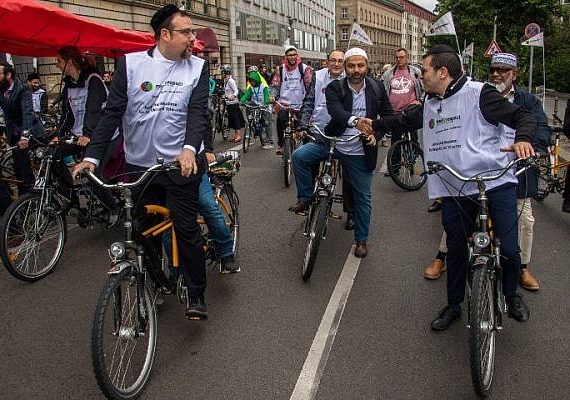
The Times of Israel
By Rabbi Marc Schneier
Dec 24, 2018, 12:59 PM
Together, the two communities are fighting Islamophobia and anti-Semitism and working to protect all faith members

Jews and Muslims, one person of each faith sharing a tandem bicycle, at the “meet2respect” bicycle demonstration in Berlin on June 24, 2018. (AFP Photo/John MacDougall)
This past year we witnessed Muslims and Jews coming together globally in the midst of challenges and calamities. As 2018 comes to an end, I am profoundly encouraged by the way our communities stood up for each other when the other was under attack.
Here are the most significant events in Muslim-Jewish relations – both globally and nationally – which took place this year:
1. On October 27, a deranged gunman murdered 11 Jews at the Tree of Life – Or L’Simcha Congregation Synagogue in Pittsburgh, PA. After learning of this tragedy, American Muslims launched a crowdfunding campaign where they raised $250,000 to assist families whose loved ones were killed or wounded in the attack with medical bills, funeral expenses and other immediate and short-term needs. Prominent Muslim leader and Executive Director of the Islamic Center of Pittsburgh Wasi Mohamed publicly shared his – and his community’s – support for the Jewish community.
2. On the Saturday after the Pittsburgh massacre, large numbers of Muslims joined synagogue services across the country to show their support for the #ShowUpForShabbat” movement. Asked why she attended several synagogue services that day, Sabeeha Rehman, a New York City writer and Muslim activist said, “I had to be there. These are my friends, my Jewish sisters and brothers, my cousins in faith, and they are hurting.”
3. Major Jewish organizations, including the Jewish Council for Public Affairs, Religious Action Center of Reform Judaism and American Jewish World Service, strongly condemned the brutal forced expulsion of Rohingya Muslims from Burma to squalid refugee camps in Bangladesh and demanded that they be able to return home with guarantees of security.
4. In March, The Foundation for Ethnic Understanding released a first of a kind study that provided a national benchmark measuring opinions and behaviors of Jewish and Muslim Americans. This groundbreaking poll showed that the gaps between the two groups were smaller than previously thought, and that the more devout the person was, the closer they aligned with the other religion. The one issue where there was dramatic disagreement was over Jerusalem as the capital of Israel.
5. Denunciation of anti-Semitic hatred and violence by prominent Muslims happened this year not only in the U.S. but in major European countries as well, with Muslim leaders in the United Kingdom, France and Germany calling out escalating anti-Semitism, including within the Muslim community. On May 19th, British Muslim leaders took out a full-page ad in The Telegraph condemning anti-Semitism. The group, Muslims Against Anti-Semitism, contended that disagreements over the Israeli-Palestinian conflict must not be an excuse for growing anti-Semitism, stating, “As Muslims, we believe that our future peace, security and prosperity…cannot be assured while the Jewish community feels under threat.” Meanwhile, in France, 30 imams published an open letter in Le Monde, calling on their colleagues to take a stronger stand against extremism and anti-Semitism within the Muslim community.
6. In April, faced with an upsurge of anti-Semitic attacks on men wearing kippot, more than 2,000 Berliners of all faiths participated in a “Wear a Kippah” march. Among them were many Muslim women who wore kippot over their hijabs. Two months later, 25 Berlin rabbis and imams rode tandem bicycles together across the city in a joint show of respect and solidarity.
7. In September, German Jewish and Muslim religious leaders and youth held a joint memorial ceremony in Auschwitz to mark the 74th anniversary of Nazi deportations to the death camp from Germany. “We promise that with our strength, with the strength of our faith, we will work together so there will ‘never again be Auschwitz,’” Aiman Mazyek, President of the Central Council of Muslims, said at the ceremony.
8. Earlier this month, the 10-year-old Dubai synagogue took a step out of the shadows when it was profiled by the media.
9. Within the span of a few weeks, we saw Israeli Prime Minister Benjamin Netanyahu visit Oman, the Hatikvah was played at the Judo games in the UAE where Israel’s Minister of Culture and Sport Miri Regev was in attendance, Bahrain invited Israeli Economy Minister Eli Cohen to a conference in the kingdom, Israel’s Communications Minister Ayoob Kara spoke at the International Telecommunication Union Plenipotentiary Conference in Dubai.
10. In November and December, the Foundation celebrated its 10th Annual Season of Twinning – its annual global event bringing Muslims and Jews together – where a multitude of events took place in 25 countries under the theme of “Common Faith, Common Fate.”
Looking ahead to 2019, it is undeniable that Muslims and Jews in America and abroad face threats from hatred and bigotry, yet we are greatly encouraged that Muslim and Jewish communities are standing shoulder to shoulder with each other. Together, we are fighting Islamophobia and anti-Semitism and standing up for the rights of all faith and ethnic groups. At a time of uncertainty, the ever-stronger Muslim-Jewish alliance is a rock of stability and cause for confidence in the future.
About the Author
Rabbi Marc Schneier is the president and founder of the Foundation for Ethnic Understanding. A trailblazer in the field of Muslim-Jewish relations, Schneier created and spearheaded the annual Weekend of Twinning’s of Mosques and Synagogues across the globe; the annual meetings of the Gathering of European Muslim and Jewish Leaders (GEMJL) in Paris and Brussels; multiple unity missions to the United States by Muslim and Jewish Leaders from around the world; and the first Summit of Rabbis and Imams. Rabbi Schneier and Imam Shamsi Ali are the co-authors of Sons of Abraham: A Candid Conversation about the Issues that Divide and Unite Jews and Muslims.
Copyright © 2025 Foundation For Ethnic Understanding. All rights reserved. | Privacy Policy